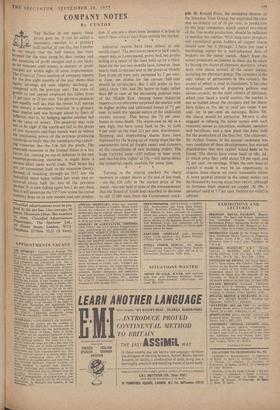COMPANY NOTES
By
CUSTOS
THE decline in our equity share prices goes on. It can be called a secondary reaction in a primary • '°F'" bull market, if you like, but 1 prefer to say simply that the bull market has been Stopped for the time being by dear money and the squeezing of profit margins and is not likely to be resumed until money is cheaper or profit margins are within sight of some improvement. The Financial Timer analysis of company reports for the first eight months of the year shows that equity earnings are now slightly declining as compared with the previous year. The ratio of Profits to real capital employed has fallen from 31 per cent. to 29 per cent. The perverse pessimist can equally well say that the recent bull market Was merely a secondary reaction in a primary bear market and was brought about by fears of inflation, that is, by hedging against another fall In the value of money. The pessimist may turn out to be right if the continued fall in the prices of raw materials and base metals were to reduce the purchasing power of the overseas producing countries so badly that the manufacturing-export- ing countries like the UK felt the pinch. The expected recession in the United States is a key factor, for, coming on top of deflation in the raw material-producing countries, it might have a serious effect upon world trade. Wall Street has not yet committed itself to the recession theory. Instead of breaking through its 1957 low the industrial share index rallied last week and re- covered about half the loss of the previous decline. It is now falling again but .I do not think
that it will penetrate the 1957 low unless the motor
industry
flops on its new models and cuts produc- tion. If you are a short-term investor it is best to watch these critical days from outside the market.
Industrial reports have been mixed, as one would expect. The BRITISH PETROLEUM half-yearly report was, as I anticipated, pretty bad, net profits falling as a result of the Suez hold-up by a third. Sales for the last two months have, however, been nearly back to normal and as the prices of Middle East crude oil were only increased by 7 per cent. in June, net profits for the current half-year should be satisfactory. But I still prefer to buy SHELL (now I 90s. and 28s. below its high) rather than BP in view of the increasing political risks of the Middle East. Among home industrial reports CALICO PRINTERS surprised the market with its higher profits and additional bonus of 74 per cent. to mark the 'special nature of the additional royalty income.' This leaves the 7+ per cent. bonus in some doubt. The shares rose 6s. 6d. to a new high, but have come back to 56s. to yield 8 per cent, on the total 221 per cent, distribution. Shipping and shipbuilding shares have been depressed by the laying-up of tramp ships (on the uneconomic level of freight rates) and rumours of the cancellation of new building orders. The huge VICKERS issue-L29 million in loan stock and two-for-five 'rights' at 33s.-will damp down the industrial equity markets for some time,
► * • *
Turning to the mining markets the sharp recovery in copper shares at the end of last week -on the £20 rally in the market price of the metal-was not held in spite of the announcement that the Board of Trade had cancelled its decision to sell 27,000 tons from the Government stock- pile. Sir Ronald Prain, the managing director of the Selection Trust Group, has expressed the view that an orderly cut of 10 per cent. in production by the large companies, which control two-thirds of the free world production, should be sufficient to stabilise the market. With long-term prospects still considered good, holders of copper shares should -now 'see it through.' 1 have just read a fascinating report by a well-informed firm of brokers on the newer metals. Apart from the actual producers an interest in these can be taken by buying the shares of JOHNSON, MATIHEy, which deals with about seventy of the newer metals, including the platinum group. The company is the only refiner of germanium in this country, the crystal of which is used in transistors. It has also developed methods of preparing gallium and silicon crystals. As the chief refiners of platinum, which now faces a world surplus, the market is not so bullish about the company and the shares have fallen to 51s. 6d. to yield just under 4 per cent. (or 16 per cent, on earnings). Below 50s. the shares would be attractive. MUREX is also engaged in refining the newer metals with such romantic names as zirconium, niobium, tantalum and beryllium, and a new plant has been built for the production of the first two. The chairman, Sir Arthur Smout, in his annual statement was very confident of these developments, but warned shareholders that new capital would have to be found. The shares have come back to 68s. 6d., at which price they yield about 5.8 per cent. and 74 per cent. on earnings. When the new issue of capital is made it may be an opportunity to acquire these shares on more reasonable terms. A more general interest in the newer metals can be obtained by buying SELECTION TRUST, although its fortunes must depend on copper. At 90s. a potential yield of 7.7 per cent. (before tax relief) is offered.






























 Previous page
Previous page